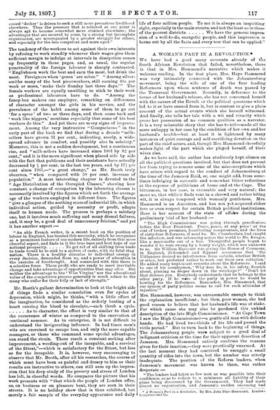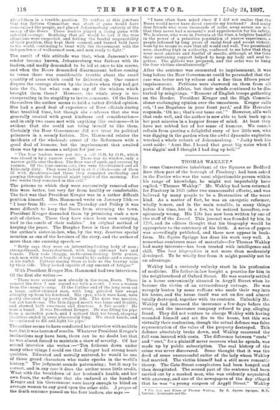A WOMAN'S PART IN A REVOLUTION.*
WE have had a good many accounts already of tile
South African Revolution that failed, nevertheless, there is that in Mrs. Hammond's narrative which makes it welcome reading. In the first place, Mrs. Hays Hammond was very intimately connected with the Johannesburg movement, being the wife of one of the four leading Reformers upon whom sentence of death was passed by the Transvaal Government. Secondly, in deference to the terms of her husband's release, she has not concerned herself with the causes of the Revolt or the political questions which led to it or have ensued from it, but is content to give a plain account of the actual events which she herself witnessed. And finally, she tells her tale with a wit and vivacity which prove her possession of no common qualities as a narrator. It is a very miserable story that she has to tell—made all the more unhappy in her case by the condition of her own and her husband's health—but at least it is lightened by many instances of quiet courage and self-sacrificing devotion on the part of the chief actors, and, though Mrs. Hammond cheerfully makes light of the part which she played herself, of their wives also.
As we have said, the author has studiously kept silence on all the political questions involved, but that does not prevent her from trying to remove some of the misconceptions which have arisen with regard to the conduct of Johannesburg at the time of the Jameson Raid, or, one might add, from some- times indulging in sarcastic and somewhat bitter reflections at the expense of politicians at home and at the Cape. The bitterness, in her case, is excusable and very natural; the more so, that while it finds vent in a shrewd and rather biting wit, it is always tempered with womanly gentleness. Mrs.
Hammond is an American, and has not yet acquired either love or even respect for certain British political institutions. Here is her account of the state of affairs during the preliminary !-,rial of her husband :—
"The High Commissioner was going through genuflexions before the Boer President. Peace, peace, at any price ! at the cost of broken promises, humiliating compromises, and tbo lives of sixty-four Reformers, if need be. Mr. Chamberlain had caught the infection, and was salaaming across tho world to Mr. Kruger, like a marionette out of a box. Thoughtful people began to wonder if he were swung by a heavy weight, which was unknown to us. Sir William Harcourt was giving the House of Commons, in England, ill-founded and flippant assurances that the Uitlanders desired no interference from outside, whether British or other, but preferred rather to work out their own salvation.' He added many unpleasant remarks about the Reformers. I said to one of his countrymen, Why does he, in his safety, flourish about, pinning us deeper down in the wreckage?' Don't let that distress you. Everybody understands that he belongs to the other party. If he ware of the party in power he would be howling for the Reformers. Remember, Mrs. Hammond, that our system of party politics seems to call for such attitudes of injustice.'"
Mrs. Hammond, however, was unreasonable enough to think the explanation insufficient ; but then, poor woman, she had
good reason to believe that her husband's life was at stake. For which cause she may also be pardoned this unkind description of the late High Commissioner. "At Cape Town I saw the High Commissioner—a gentle old man with delicate hands. He had lived two-thirds of his life and passed the virile period." But to turn back to the beginning of things.
The Johannesburg people were subject to a good deal of indignant criticism at the time for their apparent desertion of Jameson. Mrs. Hammond entirely confirms the reasons given for their inaction,—they were practically unarmed. At the last moment they had contrived to smuggle a small quantity of rifles into the town, but the number was utterly inadequate. The position of the Reform leaders, when
Jameson's movement was known to them, was rather
desperate :—
"The leaders had taken as few men as was possible into their confidence, so as to reduce to a minimum all liability of their plans being discovered by the Government. They had made almost no organisation, and Jameson's sudden oncoming had • A Woman's Part in a Bevoluti.m. By Hrs. John Hay3 Hammond. London g Lougmans and Co. placed them in a terrible position. To confess at this juncture that the Reform Committee was short of guns would have tiemoralised the people, and placed Johannesburg entirely at the mercy of the Boers. These leaders played a losing game with splendid courage. Realising that all would be lost if the true situations were suspected, and feeling the fearful responsibility of their position, they kept their counsel, and turned bold faces to the world, continuing to treat with the Government with the independence of well-armed men, and men ready to fight."
The result of this attitude was that, when Jameson's sur- render became known, Johannesburg was furious with its leaders, and madly demanded to be led at once to his rescue, and when the Boers demanded disarmament before coming to terms there was considerable trouble about the small quantity of arms which could be delivered up. One cannot dispute the courage shown by the leaders when they had got into the fix, but what can one say of the wisdom which brought them there ? However, the whole story is too exasperating in its stupidity to invite comment. Of the Boers themselves the author seems to hold a rather divided opinion.
She had a good deal of experience of Boer officials during that troubled time, but though she confesses that she was generally treated with great kindness and consideration—
and in only two cases met with anything like rudeness—it is evident that she could not bring 1-serself to like them.
Certainly the Boer Government did not treat its political prisoners in a seemly fashion. Mrs. Hammond relates the incidents of the wholesale arrest of the Reformers with a good deal of humour, but the imprisonment that awaited them was by no means a subject for jest :—
" The four leaders were put into a cell 11 ft. by 11 ft., which was closed in by a narrow court. There was no window, only a narrow grille over the door. The floor was of earth and overrun by vermin. Of the four canvas cots, two were bloodstained and all hideously dirty. They were locked in at 6 &clock—one of them ill with dysentery—and there they remained sweltering and gasping through the tropical night until 6 of the morning. For two weeks they remained in this cell."
The prisons to which they were successively removed after this were better, but very far from healthy or comfortable. The fact was that President Kruger was in a rather difficult position himself. Mrs. Hammond wrote on January 13th :— "I hear from Mr. — that on Thursday and Friday it was most difficult to keep the Boers from storming the town. President Kruger dissuaded them by promising each a new suit of clothes. These they have since been seen carrying, tied to the cantle of their saddles." An original method of keeping the peace. The Burgher force is thus described by the author's sister-in-law, who, by the way, deserves special mention as one of the heroines of the story, and the author of more than one amusing speech :—
"Betty says they were an interesting-looking body of men ; strong-framed, heavy-featured, with long unkempt hair and beards. They rode shaggy, moth-eaten-looking little ponies. each man with a bundle of hay bound to his saddle and a sausage in his wallet. Fathers among them as hale as the brawny sons by their side. They looked capable of any amount of fatigue."
With President Kruger Mrs. Hammond had two interviews. Of the first she writes :—
" There were several men already in the room, Boers. Those nearest the door I saw regard me with a scowl. I was a woman from the enemy's camp. At the further end of the long room sat a large, sallow-skinned man, with long grizzled hair swept abruptly up from his forehead. His eyes, which were keen, were partly obscured by heavy swollen lids. The nose was massive, but not handsome. The thin-lipped mouth was large and flexible, and showed both sweetness and firmness. A fine mouth ! He wore a beard. It was President Kruger. He was filling his pipe horn a moleskin pouch, and I noticed that his broad, stooping shoulders ended in arms abnormally long. We shook hands, and he continued to fill and light his pipe."
The author seems to have conducted her interview with no little tact, but it was barren of results. Whatever President Kruger's inclinations may have been, there can be no doubt but that
he was almost forced to maintain a show of severity. Of her second interview she writes :—" Ten fathoms down under many other things I could see that Kruger had strong heart qualities. Educated and morally matured, he would be one
of those grand characters who make epochs in the world's history." The judgment sounds patronising ; but it may be correct, and in any case it does the author some little credit. What with the breakdown of her husband's health, and her own fears, the sufferings that she endured at the hands of Kruger and his Government were heavy enough to blind an average woman to any good upon the other side. A propos of the death sentence passed on the four leaders, she says :— "I have often been asked since if I did not realise that the Boers would never have dared execute my husband ? And many dear friends who were thousands of miles away assure me now that they never had a moment's real apprehension for his safety. We. however, who were in Pretoria at the time, a helpless handful in the power of a primitive population of narrow experience, a people inflamed by long years of racial feud and recent victory, were by no means so sure that all would end well. Two prominent men, standing high in authority, confessed to me later that they were most anxious and fearful of results, although at the time their sustaining support helped to keep my body and soul to- gether. The gallows was prepared, and the order was to hang the four victims simultaneously."
After the sentence was commuted to imprisonment, it was long before the Boer Government could be persuaded that the case was better met by release and a fine than fifteen years' imprisonment. Petitions were showered on them from all parts of South Africa, but their minds continued to be dis- turbed by misgivings. "Rumour of English troops gathering on the Border. President Kruger and the High Commis- sioner exchanging opinion over the uneasiness. Kruger calls out, 'I see Bugaboos in your front yard,' and Sir Hercules responds, Oh no ; that's our tame cat.'" However, all's well that ends well, and the author is now able to look back upon her past miseries in a happier frame of mind. At least they have not robbed her of her sense of humour. We cannot refrain from quoting a delightful story of her little son, who was digging in the garden when the awful dynamite explosion wrecked a whole suburb of Johannesburg. "Jacky took hie aunt aside : Aunt Bet, I heard that great big noise when I was diggin' and I thought I had dug up hell."



































 Previous page
Previous page